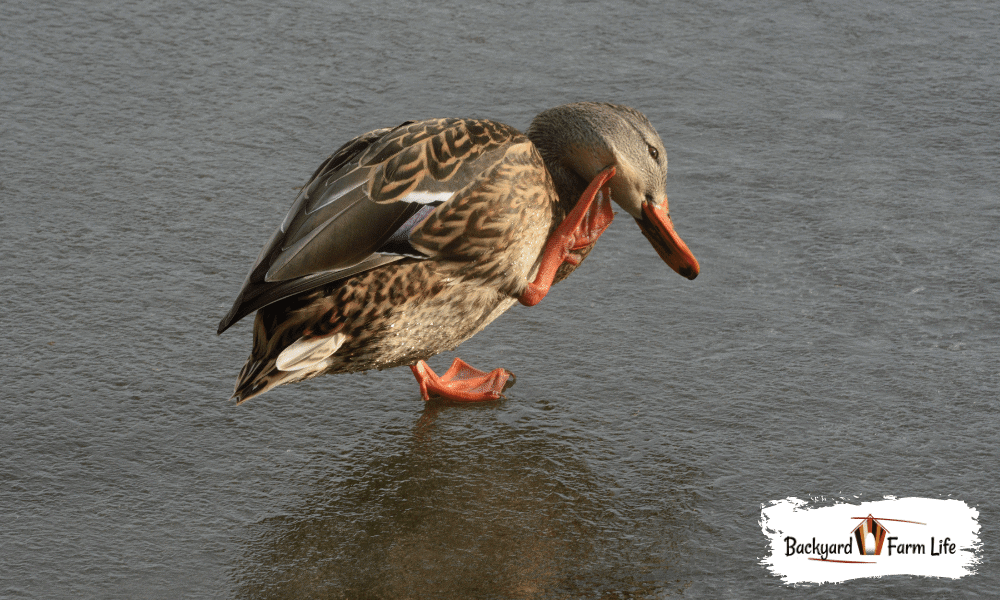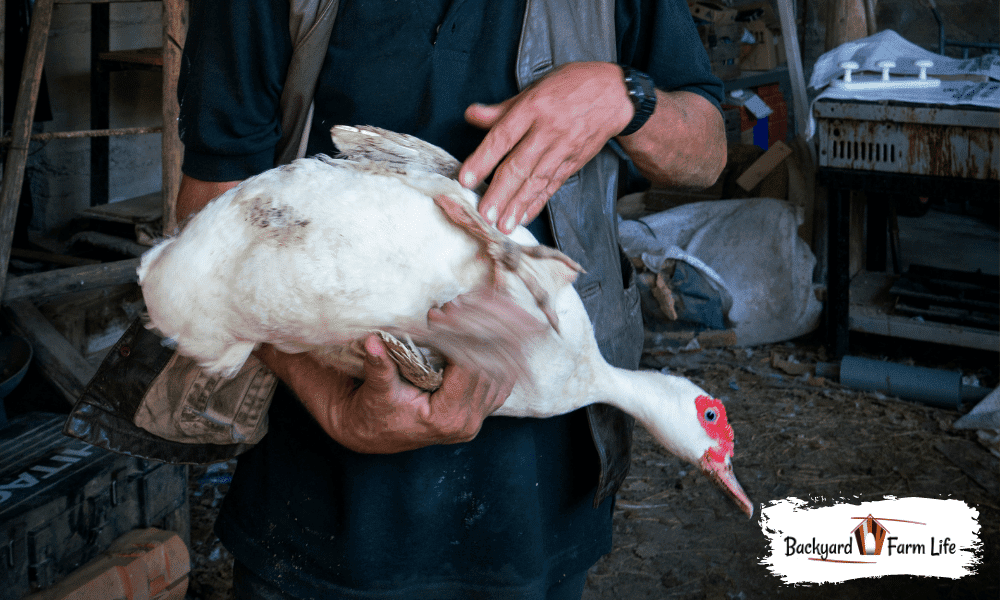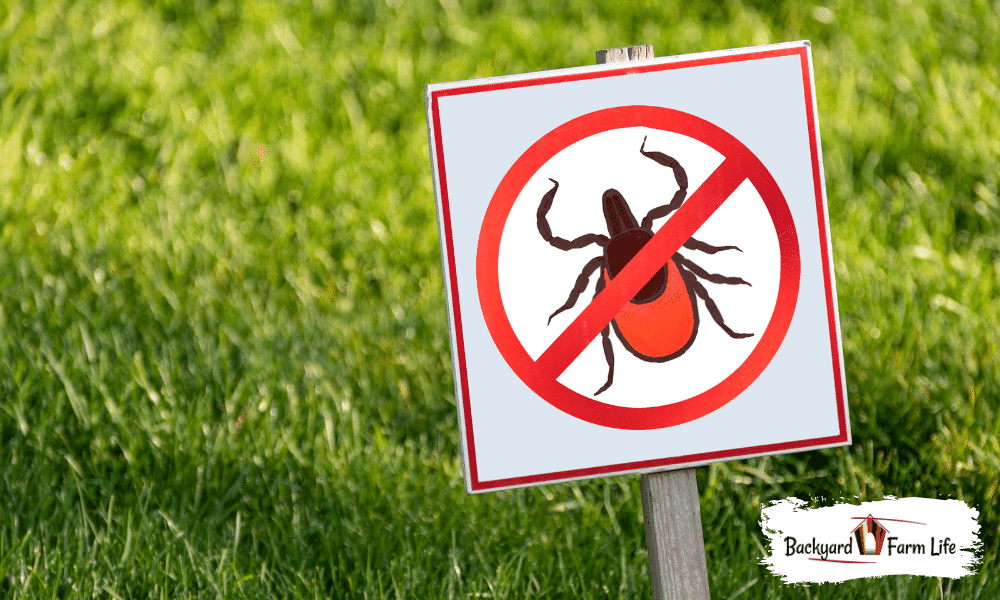For those that are experienced owning backyard poultry, the last thing you want is nasty fleas, mites, or lice in your coop or on your beloved animals!
It’s true, normally these types of pests aren’t a problem… until they become one!
To be frank, in a normal backyard setting it’s very rare to find any fleas, mites, or lice affecting your ducks, but when it DOES happen you need to be prepared.
Here’s whether ducks get fleas, mites, or lice, how to identify them, how to fix the problem, and some tips to prevent any issues in the future!
Contents
Can Ducks Get Fleas?

As proud and heedless as ducks can be, they are not immune to all types of parasites and pests.
However, unlike some household pets like cats and dogs, it’s incredibly rare to find a duck afflicted by fleas.
Not only are ducks’ body temperatures relatively high, but their frequent swims and baths in water together with their preening skills make them a very unlikely and unsuitable host for fleas!
This is great news for those that let their ducks free-range in long grass or pastures, as you never really need to worry about these types of pests.
But, even though ducks don’t generally get fleas, there are a few species of mites that can be a problem.
Can Ducks Get Mites?
With ducks, you don’t need to worry about too many nasty parasites. But, out of all of these creepy crawly pests, mites are one of the most common that affect ducks.
The most common in the US and in moderate climates is the northern fowl mite. These northern mites can quickly afflict ducks, and spread to most poultry including chickens and geese.
Their cycle from egg to adult is complete within a week or less, and they are most commonly located near the vent of the duck or on the back.
Another common mite that can afflict ducks is the Red Roost Mite, also known as the Chicken Mite.
Although ducks can preen these pests and water baths will wash some of them away, their quick life cycle can make them hang around on the duck or around the coop for long enough to be a real threat.
Signs Of Mites In Ducks

Depending on the severity of the mite affliction, ducks can show varying symptoms. Although it can vary between mite species, general symptoms of a mite infestation include:
- Reduced egg production
- Weight loss
- Reduced appetite
- Lethargy
- Dried blood or blackened feathers near the roots, or excess dandruff-like flakes.
- Agitation to the afflicted area (including scratching & excessive preening)
So, if you notice any of the above signs in your flock, it’s well worth inspecting them for any evidence of a mite infestation.
How To Check Your Duck For Mites?

The most common areas of a duck that are targeted by mites are the roots of their back feathers or near and around their vent. They can also afflict the back of their neck.
The veterinarian entomology organization is a great resource and has perfect example pictures of what a mite affliction looks like on poultry.
To check your ducks for mites, simply make your way through their plumage, looking for blackened or bloody patches at the roots of your duck’s feathers. Mites themselves are tiny, but they tend to group together, forming black-brown speckles on their feathers.
You will visually be able to tell if a duck is suffering from a severe mite infestation.
Can Ducks Get Lice?
Although lice are a general annoyance, they don’t tend to cause such severe symptoms in ducks compared to mites.
Not only do ducks resist most types of lice because of their constant swimming and cleaning, but the life cycle of most lice doesn’t allow for such drastic symptoms to take effect.
Nonetheless, it is still possible for lice to overcome a duck but this only really occurs in those that are elderly, sick, or injured, who can’t properly preen themselves.
The most common lice found on ducks are feather lice. These tiny lice cling onto and thrive on the feathers of ducks.
Still, a normal, healthy duck will quickly bathe and preen these pests away, so treatment is only necessary in more extreme cases.
How To Get Rid Of Fleas, Mites, Or Lice On Ducks
Alright, so you’ve found some unwanted pests bothering your ducks. What next?
Well, the first step is not to panic. Although it can be quite gruesome and horrific, there are plenty of solutions to get rid of fleas, mites, or lice on your ducks!
The first step is to consult a veterinarian or seek some trusted pet advice from your local pet care store.
This is crucial, as every brand of anti-parasitic medicines has different applications and dosages, so it’s best to get some advice from professionals.
Nonetheless, it’s very likely they will recommend a few easy and safe-to-use solutions like Pyrethrin, Carbaryl, or coop mite spray.
Again, always follow your veterinarian’s advice. They will usually recommend two doses of treatment every 7-14 days, given the mite’s life cycle it’s essential to rid them all.
How To Prevent Fleas, Mites, And Lice On Your Ducks

Though ducks are naturally good at preventing fleas, mites, and lice, there are still some easy-to-use preventative measures you can take to ensure your flock is receiving their fullest protection.
To help prevent these pesky pests, you should:
- Always keep your coop clean!
- Use natural pest deterrents around your coop, like peppermint oil to keep away rodents.
- Ask your local pet care store for mite control spray, and follow the directions to protect your coop.
- Inspect your ducks if they show any signs of affliction
- Make it a routine to physically check your duck for any observable issues, every month or two is absolutely fine, but you can choose to do it more frequently.
- Minimize contact between your duck and wild birds.
To Wrap It Up
For the most part, you shouldn’t need to worry about fleas, mites, or lice on your ducks. Their body temperature is high, they’re great at cleaning themselves, and they’re often in and out of water.
This makes it tougher for these pests to really survive long enough to become a problem
However, it does happen, particularly with mites.
If you notice any warning signs of an infestation, you should always examine your duck for evidence.
If there are any pests present, consult with a veterinarian or trusted pet care specialist as to what the best remedy is for you.
